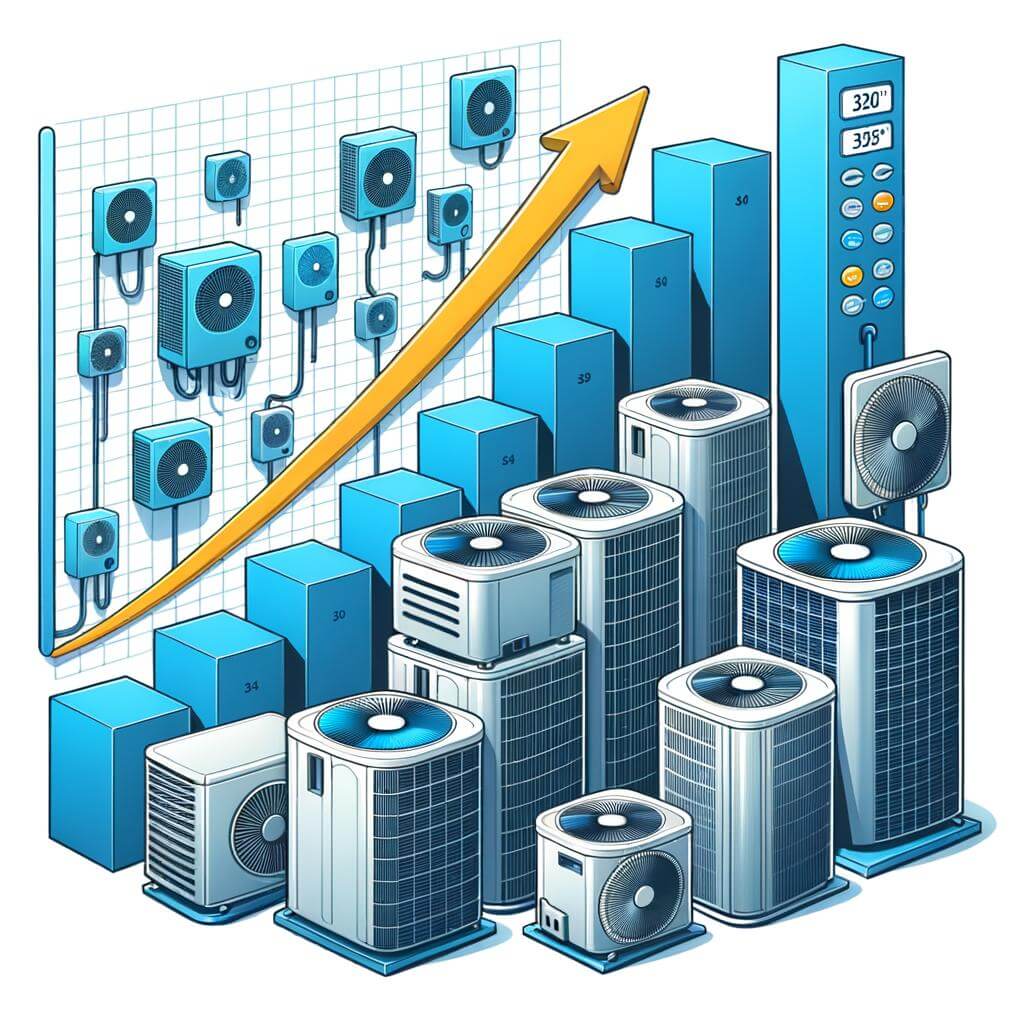Welcome to our comprehensive guide: ‘Estimating Your Air Conditioning Replacement Costs.’ Designed to help you navigate the often-perplexing world of AC unit replacement, this post provides clear, educated advice that will help you make an informed and financially savvy decision. Get ready to gain in-depth knowledge on common expenses related to air conditioning replacement, and understand the factors that impact these costs. By leveraging expert opinions and factual information, we ensure you’ll be equipped with all the necessary tools, translating the process from a daunting task to an easy, approachable project. Let’s embark on this informative journey and save you money, time, and stress for your air conditioning replacement.
Understanding the Factors Influencing Air Conditioning Replacement Costs
Estimating the cost of replacing your air conditioner can be daunting. Several factors come into play, and understanding these can help you estimate how much you’ll likely spend. Energy Efficiency, Size, Brand, and Installation complications are the four main aspects that will significantly influence the lower or higher end of your cost bracket.
- Energy Efficiency: Modern air conditioners are built to be more energy-efficient which not only helps reduce the environmental impact but also decreases your energy bills. However, energy-efficient models can be more expensive upfront. The Seasonal Energy Efficiency Ratio (SEER) rating will offer an insight into the efficiency of the model. A higher SEER rating indicates better efficiency but also a higher initial cost.
- Size: A large-size AC unit cools more square footage but also costs more. To estimate the size required, professionals generally consider the total square footage, insulation levels, number of windows and so forth.
- Brand: The brand of the air conditioning unit can considerably influence the replacement cost. Premium brands offer advanced features and guarantees, but come with a price tag to match.
- Installation complications: The specific installation scenario – replacing an existing unit, new installations requiring ductwork, or units installed in difficult-to-access spaces – will impose additional costs.
The second considering point is the additional costs. They can impact the overall costing to a considerable extent. The main extra costs you might encounter include Labor costs, Old unit removal costs, Regional cost variables, and Optional add-on costs.
| Additional Cost Factors | Description |
|---|---|
| Labor costs: | It’s important to factor in the cost of professional installation and maintenance. The rates are dependent on the complexity of the setup and location. |
| Old unit removal costs: | Some companies charge extra for the removal and disposal of the old units, if it’s not included in the initial quote. |
| Regional cost variables: | Costs can vary greatly depending on where you live. Factors such as local competition, cost of living, and supply and demand all play a part. |
| Optional add-on costs: | Finally, there are costs for optional extras like programmable thermostats or air purifiers. These elements can considerably add to the overall replacement cost. |

Evaluating the Impact of AC Size and Efficiency on Replacement Expenses
When deciding on a replacement air conditioner, two key factors to consider, which can significantly impact the overall cost, are the size and energy-efficiency of the unit. Size is crucial because an AC unit that’s too small won’t be able to effectively cool your home, while one that’s too large will cycle on and off too quickly, resulting in increased wear and higher energy bills. To get the optimal size, professionals typically use a measurement called a ’ton’ – one ton equals to 12,000 BTUs (British Thermal Units) per hour. Also, consider the energy-efficiency, measured by SEER (Seasonal Energy Efficiency Ratio). A higher SEER means more efficiency and thus, lower energy costs.
Let’s look at a simple example of how these factors might influence the cost of replacing an air conditioner. Below is a basic table illustrating cost differences based on various combinations of AC size and SEER rating.
| AC Size (Tons) | SEER Rating | Estimated Cost (USD) |
|---|---|---|
| 2 | 14 | $4,000 - $5,000 |
| 3 | 16 | $4,500 – $5,500 |
| 4 | 20 | $5,000 – $6,000 |
Remember, these are ballpark figures. The actual cost will depend on various factors, including installation charges, current ductwork condition, and local climate. It’s always a good idea to get multiple estimates from professionals to ensure you’re getting the best deal. Also, investing in an energy-efficient model may cost more upfront but can save you a substantial amount on utility bills in the long run.
Comprehending the Role of Labor and Installation Charges in Total Cost
If you’re considering an air conditioning system replacement, there are key cost aspects that shouldn’t be overlooked. While people typically focus more on the price tag of the actual unit, it’s crucial to understand that labor and installation charges play a significant role in the total cost. The cost of labor and installation can vary significantly based on factors like the complexity of the install, the type of the air conditioning unit, and where you live.
You should anticipate predictable expenses such as the purchase of the unit itself, but the labor entails much more. Some expenses you might need to account for include:
- Dismantling and disposal: Specialists will need to remove your old unit. This process can be laborious and time-consuming.
- Unit Installation: Once your old system has been removed, the new one must be installed. This cost varies widely depending on the complexity of the system.
- Ductwork: If your home needs new ducts or if the existing ones require significant repairs, this can add to the overall cost.
- Electrical Work: Your new AC unit may require electrical upgrades. Factor in the cost of a licensed electrician to meet the demands of your new system.
| Cost Item | Estimated Cost |
|---|---|
| Dismantling and disposal | $70 – $200 |
| Unit Installation | $1500 – $6000 |
| Ductwork | $2000 – $4,500 |
| Electrical Work | $70 – $300 |
Remember, these are rough estimates and actual expenses will depend on specific circumstances. Always consult with a licensed HVAC professional for a detailed breakdown of costs.

Smart Tips to Reduce Air Conditioning Replacement Charges
Swapping out an old or malfunctioning air conditioning system can often lead to high costs, but several smart strategies can help you minimize these expenses. One of the most effective methods is to do your research before you even begin sourcing a new AC unit. You should understand the difference between central air systems versus ductless mini-split systems, the energy efficiencies of different units and the overall costs you can expect. By comparing brands, models and prices, you can avoid paying for features you don’t really need.
In addition to research, another proactive step you can take is to regularly maintain your existing air conditioning system. Regular tune-ups, filter changes, and service check-ups can prolong the life of your unit and delay the need for a replacement. When the time comes for an air conditioning replacement, a well-maintained unit has higher trade-in or resale value. Furthermore, you can take advantage of discounts and rebates during off-peak seasons to get a more affordable deal. Here are few points to keep in mind:
- Research various AC brands, models, and prices.
- Maintain your current AC regularly for durability and good resale value.
- Take advantage of off-peak discounts and rebates.
| Air Conditioner Type | Average Lifespan (years) | Average Replacement Cost ($) |
|---|---|---|
| Central Air System | 15-20 | 6,500 - 12,000 |
| Ductless Mini-Split System | 10-15 | 3,000 - 7,000 |
Knowing the type of your system, its age and average replacement cost will help you budget your AC replacement more effectively.
Leveraging Financing and Rebates to Offset Replacement Costs
When looking to replace your air conditioning system, it’s essential to consider the financial assistance that can help reduce your overall investment. Various financing options are available depending on your situation, including personal loans, home equity loans, or air conditioner manufacturer financing programs. While personal and home equity loans are subject to credit approval and can be secured within a few days, manufacturer financing programs often offer special promotional rates, making them a potentially more affordable option.
Furthermore, you should also be aware of the potential savings offered by rebates. Many utilities and state programs offer rebates for energy-efficient air conditioning units to incentivize homeowners to reduce their carbon footprint. For instance, you might be able to avail of a rebate from your local utility company or a tax credit from your state if you install an energy-efficient system. You can check the Database of State Incentives for Renewables & Efficiency (DSIRE) for available options in your area.
| Financing Option | Description |
| Personal Loan | Subject to credit approval, can be secured within a few days. |
| Home Equity Loan | Based on the equity in your home, may have longer approval process. |
| Manufacturer Financing Program | Offers including zero or low interest promotional finance rates. |
Remember that when constructing your project budget, it’s ideal to factor in these financing and rebate opportunities. They can significantly decrease your out-of-pocket costs, making your AC replacement more financially manageable.
Final Thoughts – How to Make an Informed Decision on AC Replacement
In closing, when considering an air conditioning replacement, two key factors should always be front of mind; the unit’s efficiency and the cost of operation. Bear in mind that the higher the Seasonal Energy Efficiency Ratio (SEER) number is, the more energy-efficient the unit. Modern AC units typically range from a SEER of 13 to 25. To make an economic and savvy decision, it’s crucial to factor in your system’s operating cost alongside its upfront cost. Remember that while a unit with a higher SEER may be more expensive upfront, it could save you considerable cash in the long run with lower energy bills.
Longevity is another crucial consideration. While an AC unit’s lifespan can range widely between 10 to 20 years, depending on the model and regimen of maintenance, it’s advised to begin exploring replacement options once your unit hits the 15-year mark. Consequently, tallying the estimated life of the unit against its anticipated energy savings can offer another valuable perspective on overall value. Here’s a basic comparison table:
| AC Unit SEER | Estimated Lifespan | Approximate Energy Savings |
|---|---|---|
| 13 SEER | 10 years | Low |
| 20 SEER | 15 years | High |
| 25 SEER | 20 years | Very High |
Thus, making an informed decision on AC replacement involves weighing the unit’s upfront cost and estimated lifespan against its SEER and predicted energy savings. By carefully balancing these factors, homeowners can effectively select an air conditioning system that meets their needs while optimizing for long-term economy and efficiency.
In Conclusion
As we draw the curtain on this comprehensive expert guide, keep in mind that estimating your air conditioning replacement costs is a crucial step ahead of any potential replacement. It enables you to plan, budget, and make informed decisions. The elements we’ve explored, including the unit’s size, energy efficiency, brand, installation complexity, and possibly ductwork repairs, all play significant roles in defining the overall cost.
We highly encourage you to capitalize on quotes from various HVAC contractors to ensure you’re getting the best deal possible. Remember, an investment in a high-quality, energy-efficient air conditioning system today will likely result in tangible energy savings down the road. We hope this guide has been helpful in painting an accurate picture of the potential costs you may face when considering an air conditioning replacement. Thank you for choosing our guide to navigate this complex topic, and we wish you the best of luck in your HVAC journey.




